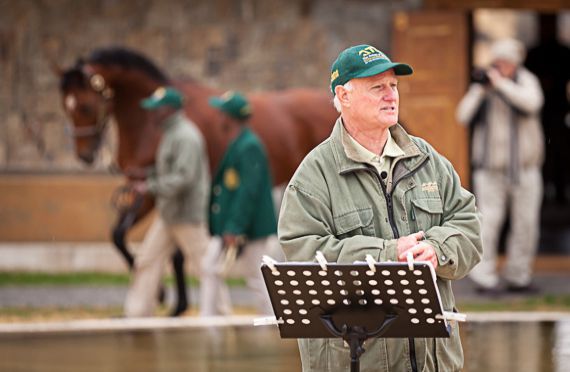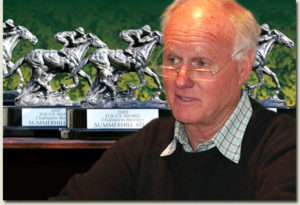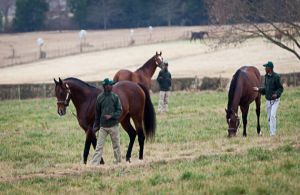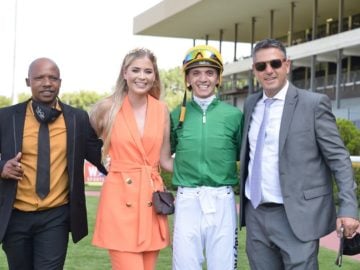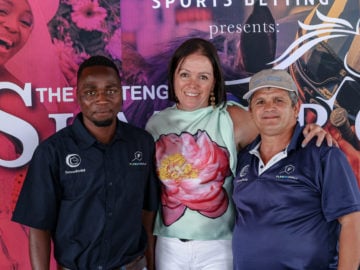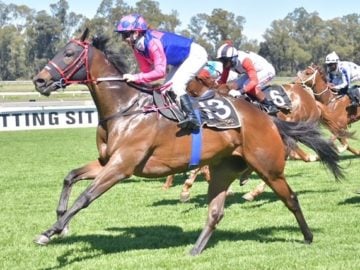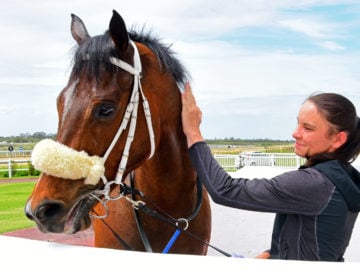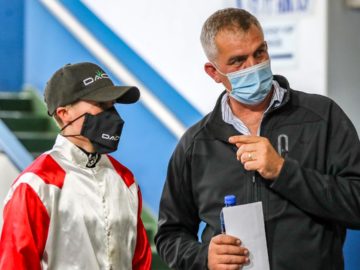After a hiatus of two years, Summerhill have fought their way back to the Champion Breeders title in a nail-biting end of season finale and can now make it an even 10 trophies on their mantelpiece.
Summerhill traces its roots back to the 1870’s when Hartford Farm was granted to the family of last Colony of Natal’s Prime Minister, Sir Frederik Moor. It passed into the hands of the Ellis family in the 1940’s and the Goss name became attached to the Hlatikulu Road stud in 1979, starting out as a 6,25% equity share in lieu of legal fees. From there the Summerhill story has been built, brick by brick from the ground up, richly embroidered along the way with stories, people and most importantly, horses. And no-one tells it better than Mick.
“Whilst I didn’t inherit their worldly goods, what I did get from my father and grandfather, was the ‘disease’. For as long as I can remember, horses were in my blood, and it developed into an obsession. I knew most of the racehorses in the country and their pedigrees. I knew the names of all the July winners from the ’40s onwards, and I was addicted to Duff’s Turf Guide from the time I first sat on a potty.” As all who have met him know, Mick’s enthusiasm has waned little in the interim.
The Story of 10
While Summerhill had been knocking on the Breeders’ Championship door for a few years, the 2003/04 season announced their arrival as serious heavyweights when they finished just behind Maine Chance Farms going down in a fight. Mick recalls, “We had spent the last six weeks of that season exchanging blows with Maine Chance and it went right to the last race on the last day of the calendar. Two Summerhill graduates, Royal Emblem and Fez took the Thekwini and Premiers Champion Juvenile Stakes respectively, and we held a slender R180 000 lead going into the Champions Cup itself. That’s where Maine Chance struck with Gary Alexander’s James Jaguar, winning the Championship in the very last race. Although it was the 7th or 8th title for Maine Chance, it was the first time they won it for new owner Dr Andreas Jacobs and fitting that his investment had been so soundly rewarded.”
The following year Summerhill turned the tables, surpassing Maine Chance and taking home their very first Breeders’ Champion trophy. Mick says,
“For what it’s worth, until that time, the Championship had only been won by five entities throughout its history,
with only Birch Bros, Koster Bros, D Cohen and Sons, Highlands Farms and Maine Chance on the honour roll.” However from 2005 that number became six as the Breeders Championship became something of a procession, heading up the N3 to Summerhill for the next eight years in a row.
In the balance
Of course, in life the only constant is change. As the margins narrowed, Mick acknowledged that the competition were getting better and stronger year on year and Klawervlei won the Championship in 2014 and again in 2015. However, this year saw Summerhill heading into the last week of the season with a R600k lead. When we chatted to Mick last week to ask how the nerves were holding up, he laughed, “I can tell you from my own experience that it can change on the last day, but I’d rather be sitting with a R600k lead, than 2nd place. We don’t have any expectations, but we’re sitting here in hope!”
With a number of meetings postponed or rained out entirely, there seemed to be divine intervention at play and at one stage even the Gold Cup meeting looked in jeopardy. “If you recall, last year there was no Gold Cup day on the last day of the season – it was postponed by a week,” says Mick. “Although Summerhill is sitting in the lead, I think we’d all like Gold Cup day to take place at the right time. It’s nice to have the championship races run before the season’s out because it affects so many things, including the best juvenile, champion 3yo and so on.”
As it turned out, he got his wish. Local racing completed the championship season as planned and Summerhill maintained their lead and with a little over R600k to spare, finished ahead by the proverbial half a length.
Being different
With the dust having settled, the numbers totted up and the inscriptions being applied to this year’s trophies, how does it feel to have made it a perfect 10? “It’s become very difficult to maintain one’s currency in the present environment and if I’m honest, I wasn’t sure we’d see another.”
“When we came into breeding, it was the domain principally of old farmers – people like the Prices, Kosters and Birches who had been in the game for generations. In those days, guys bred by intuition more than anything else. That still plays a material role, but the reality is that dough trumps most things and if you have it, you can simply go out and buy what you need. I hasten to add that it’s to the general benefit of the South African Thoroughbred – all this money is buying genetics we could never have before, which means that
we are probably better placed in terms of the quality of our horses and getting closer to international relevance than we’ve been in a long time.
“However, it makes it difficult for the little guys to exist and we are in that category. Because we don’t have the dough lying around to buy the top stallion prospects or mares at sales, etc, we have to spend a bit more time thinking about what we’re going to do and how we’re going to do it – whether it’s how we manage our environment, our nutrition, investing in our staff – even just getting up a little earlier in the morning. Attention to those things can make a difference at the bank, the championship race and so on. It’s difficult to say those things without demeaning someone else,” Mick says reflectively. “There are different strokes for different folks and everyone has a different view on how to manage staff, feeding and how to treat the environment – but I do know that if we hadn’t done those things, we would be among the also rans.”
“Perhaps in our case the difference has been the imperative. While it would be lovely to say that our innovations have been the results of great boardroom decisions, the truth is most often it’s knee jerk, because you’ve got no-where else to go. It wasn’t going to be enough to look over the neighbour’s fence to see what he was doing and what we could do to catch up. We had to make changes in order to differentiate ourselves and maintain our relevance.”
Stallions
“This season we’ve had 6 stallions that got the job done for us. I was pretty astounded when preparing the stuff for our stallion brochure – Mullins Bay, AP Arrow, Brave Tin Soldier, Admire Main, Kahal, Visionaire – they’ve all pulled their weight.”
“Summerhill has had to rely on a pool of stallions all the years we’ve been here – some have been better than others – but there’s no doubt that we’d sink if we tried to achieve our results only on our stallions. We’ve had to rely on a combined push as we just don’t have the Captain Al’s, Trippis and Dynasty’s to rely on. Hopefully we’ll get back there though, because South Africa finds itself in a slippery spot where the proven horses with an established record on which you’d like to depend are not going to be around all that much longer. If you took the top 5 out of the equation, you’d be looking for the next big horse.”
“The new young horses we have on the farm are an exciting bunch – I’ve got to believe this or I wouldn’t sleep at night!” he laughs. “We’ve seen a bit of a shift in emphasis and find ourselves with 5 sprinter-milers on the roster, four of whom have not had a runner yet. Ato’s got foals, Capetown Noir will be getting his first foals in the next few weeks, and then we’ve also got Willow Magic and Act Of War. We’re talking proper horses here. Potentially, we’re in a better space than we’ve been before.”
“And of course there’s Linngari, who I think is a better stallion than he’s given credit for. He stood privately and has never been exposed to proper commercial opportunities and yet he has had a good season with a good few Group winners in 2016, four Black type performers in South America this year, and he split the two rising stars of French breeding by 3 year old earnings last season. He’s a proven solid winner-getter and capable of getting a proper horse. There’s a lot to look forward to.”
Health
While Mick is justifiably proud of his farm and his team, he is also at the forefront on the matter of our export protocols, delivering a compelling speech to the Asian Racing Conference in Mumbai earlier this year, which was swiftly overshadowed by his well-publicised health scare.
“I was amazed, at times overwhelmed, by the sympathy and support. The racing game is one of the toughest in the world. People don’t like it much when you’re winning too often and let’s be honest, second sucks, but in times of adversity, there is no community as generous and sincere when you need it.
It’s been an emotional journey for me and I’m relieved to have come through this and know I belong to a community who do worry.
I’ve had messages and phone calls and people have come from all over the country just to check up on me. How do you put a value on those friendships? It’s been a fantastic revelation and almost makes getting sick after India worthwhile!”
Good space
“Getting back to the conference, I’d say we’re in a better space than we’ve ever been politically, scientifically and in terms of facilities – and let’s not forget the advertisement that our horses have brought on themselves in their achievements abroad. Most important was the reaction from our trading competitors. When we pointed out that we’ve exported horses all over the world and are regular buyers at their sales – without any reciprocity at all – even the most conservative came to the realisation that it’s time for a change. With good horses and well placed people who have a solid reputation in the sales rings and racecourses of the world, I think we’re in a better spot than we’ve ever been to influence a change in the way forward.”
‹ Previous



